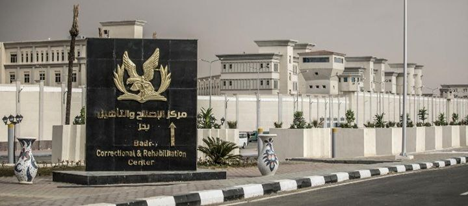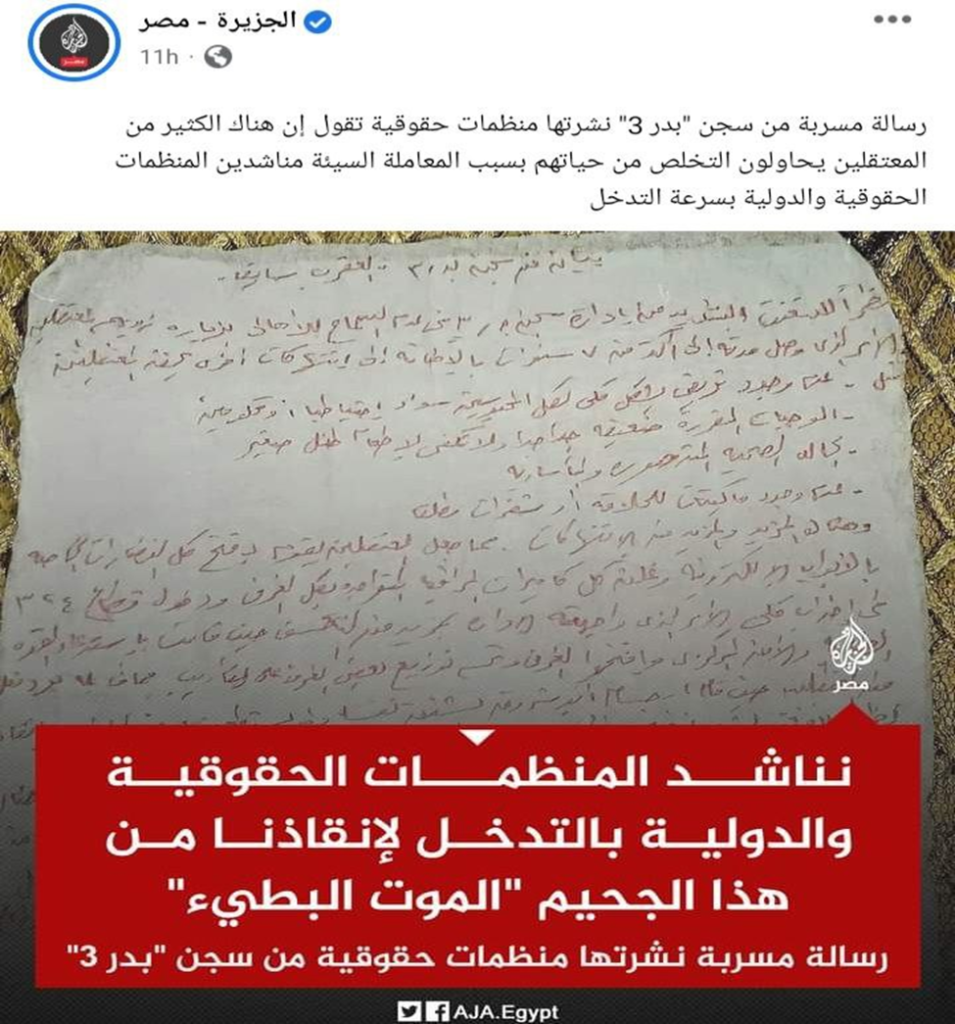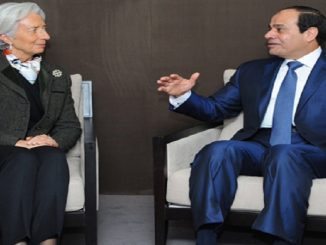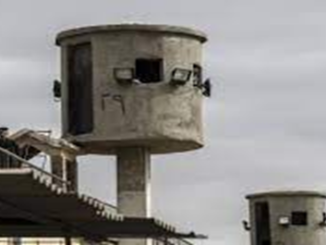
A message leaked from the Badr-3 Prison – formerly “Al-Aqrab” (Scorpion) – and circulated by Egyptian rights organizations and activists, projects human rights “brutal” violations and abuses in Egyptian prisons.
The message signed by Badr-3 Prison detainees / sectors 1, 2, 3, and 4, stated that “Due to the extreme intransigence of the of administration of Badr-3 Prison –formerly Aqrab (Scorpion) Prison– especially in failure to allow families to visit their detained beloved ones for more than 7 years, in addition to many other violations.”
A Twitter account of an Egyptian rights group, named, “Haquhum”, tweeted, saying: “A message leaked from inside Badr-3 Prison reveals the catastrophic conditions and tragic events there.
The abuses enumerated by the leaked message included:
– Complete absence of exercise periods for all detainees, whether those in pretrial custody or others spending their prison sentences.
– The prison meals set for prisoners are too insufficient to feed a grown-up prisoner, even not sufficient to feed a little child.
– The health conditions of prisoners are deteriorating and tragic.
– Complete absence of razors or blades.
Many rights defenders published and circulated the leaked message on social networking sites.

The new prison, Badr Prison Complex, is touted by Egypt as a model for reform, that holds some of the most prominent political prisoners and Muslim Brotherhood leaders, denies inmates healthcare and subjects them to punitive treatment including isolation and deprivation of family visits.
Also, Al Jazeera reported about the message, saying, “A leaked message from Badr-3 Prison, stated that there are many detainees who attempted suicide due to the ill-treatment they were exposed to; and appeal to the local and international human rights organizations to quickly intervene to save them.

According to the leaked message, the brutal violations “forced detainees to open all the small holes up the electronic doors and cover all the surveillance cameras located in cells. Moreover, sectors 3 and 4 went on in a full hunger strike, which the prison administration faced with practice of more abuse, where it summoned the strike force and the central security forces and stormed prison cells, where some cells were referred to disciplinary punishment.”
These intransigent procedures from the prison administration were met with various reactions from detainees, such as:
– Prisoner Hossam Abu Shorouk hanged himself, and inmates were not able to save him, due to his extreme weakness they all suffer from, due to the hunger strike.
– After the earthquake that hit Turkey, Mohamed Turk Abu Yara asked the prison administration to allow him for a phone call to check on his family living there, but the prison administration denied his request, which forced him to cut off the arteries of his hand, and no one knows further details about his health condition.
– Due to the strike force’s brutal intervention with detainees, a detainee called “Taha” suffered a very severe heart attack; but the prison administration only responded several hours later, despite the fact that inmates had kept knocking on the cell doors to call for help to save the prisoner. Due to this intended negligence, the patient became completely out of breath, with signs of severe blueness in the face; and there has not been any news about him since then.
– Prisoner Awad No’man cut off the arteries of his hand and was transferred to Badr Hospital by the Prison Service.
– Muslim Brotherhood General Guide Dr Mohamed Badie went on a full hunger strike, due to the ill-treatment he has been exposed to by the prison administration, including not allowing him medication or going to the prison hospital, not allowing him to attend the hearing sessions before the Public Prosecution.
Many of the inmates now in Egypt’s new Badr prison on the outskirts of Cairo were moved from Tora, an older facility in a southern suburb of the city that held prisoners including leaders of the Muslim Brotherhood and other political activists.
Rights groups estimate tens of thousands of people have been jailed for political dissent under Abdel Fattah al-Sisi and have long reported abuses including systemic torture and life-threatening conditions inside its jails.
“These are only some cases, but not all, as the number of hunger strikers is constantly increasing and those who are about to commit suicide are so many, due to the ill-treatment prisoners are suffering, which is getting worse day after day,” the leaked message read.
Brotherhood media spokesman comments
Commenting on the leaked message from Badr-3 Prison, Sohaib Abdel Maqsoud, the Muslim Brotherhood media spokesperson, released a statement, reading, “The Muslim Brotherhood holds the Egyptian regime responsible for the crimes committed against political detainees behind bars. It also holds the authorities fully responsible for the health of MB General Guide Dr Mohamed Badie, after he went on a total hunger strike, due to the ill-treatment he is exposed to inside his prison.”
“The MB also calls on local and international human rights organizations to undertake their duty and save the lives of detainees that are being exposed to slow death, and to form a fact-finding committee to investigate the conditions at Badr Prison Complex, especially after several circulated reports about flagrant violations against prisoners, that have even claimed the lives of some of them,” the statement read.
At the end of the leaked message, the prisoners in Badr-3 Prison / Sectors 1, 2, 3, 4 appealed to “all local and international human rights organizations to quickly intervene to save us from this hell of ‘slow death’ that the state has been exposing us to for years.”
Moreover, the message stated that the Assistant Minister of Interior has recently visited to Badr-3 Prison but told them that it was not in his power to respond to their demands, most prominently allowing visits.
The Egyptian political detainees’ complaints about inhuman conditions in the new Badr Prison Complex revealed a different aspect of the abuses and pain they are subjected to under Egypt’s Abdel Fattah al-Sisi.
On 20 January, the London-based Egyptian Network for Human Rights (ENHR, published some handwritten letters, which it said were leaked from detainees inside Badr prisons.
The detainees described the prison as “the toughest of all Egyptian prisons.”
Human rights organizations, including Amnesty International and the Arab Network for Human Rights Information, estimated that there are approximately 65,000 political detainees in Egypt.
Badr 3 Prison officially opened on 30 December 2021, under the name of the New Central Prisons Complex.
The prison is located 70 kilometers to the northeast of Cairo, on an area of 85 acres, including 3 reform and rehabilitation centers.
The regime’s main motive for building the new prison was to exploit the location of the Tora prisons area overlooking the Nile in Cairo for investment projects, so the political prisoners were transferred to the new complexes, including Badr.
This was after the announcement of the evacuation of a number of the main prisons, replacing them with the new Badr prison complex, with hopes for “better human conditions” for the detainees.
The opening of prisons came as part of the so-called “New Republic” campaign that prisons will contain advanced care systems, especially in terms of food and health, which proved to be groundless.
The reality was contrary to the claims of the regime and its security services, as most of the Badr prisoners are among the leaders of the Muslim Brotherhood and the Egyptian opposition, including the elderly, and many of them were inmates of the al-Aqrab Prison (Scorpion Prison).
According to the Egyptian Network for Human Rights, these prisoners are “now presumed dead.”
Under the title of “We Are Dying,” the organization received written letters from inside Badr-3 Prison, confirming the continuation of the horrific human rights violations.
Another shocking message was leaked on18 January 18, and confirmed deterioration of humanitarian conditions, ill-treatment, health care, and nutrition. It pointed out that despite being very cold this winter, the prison authorities refused to bring winter clothes; chronic diseases spread among the detainees, some of whom had already died as a result of this inhuman condition.



